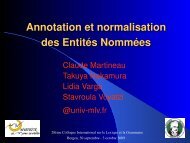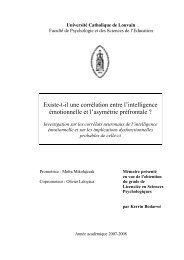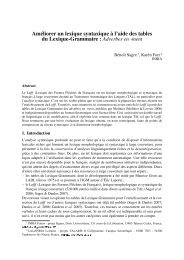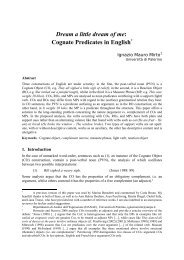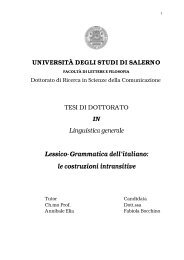- Page 1: Thèse de doctorat pour l’obtenti
- Page 5: Résumé Les tables du Lexique-Gram
- Page 10 and 11: Table des matières III Conversion
- Page 12 and 13: Table des matières 12
- Page 14 and 15: Chapitre 1 Introduction 1999, sa de
- Page 16 and 17: Chapitre 1 Introduction Le chapitre
- Page 19 and 20: 2 Les analyseurs syntaxiques et les
- Page 21 and 22: 2.1 Analyse syntaxique Figure 2.1:
- Page 23 and 24: 2.1 Analyse syntaxique dessous de 6
- Page 25 and 26: ShP1 et StP1 2.1 Analyse syntaxique
- Page 27 and 28: 2.2 Lexiques syntaxiques chaque lem
- Page 29 and 30: 2.2 Lexiques syntaxiques De fait, l
- Page 31 and 32: 2.2 Lexiques syntaxiques Les foncti
- Page 33 and 34: 3 Les tables du Lexique-Grammaire D
- Page 35 and 36: 3.1 Notations du Lexique-Grammaire
- Page 37 and 38: 3.1 Notations du Lexique-Grammaire
- Page 39 and 40: 3.2 Point de départ : Les tables d
- Page 41 and 42: 3.2 Point de départ : Les tables d
- Page 43 and 44: N0 =: Nhum N0 =: N-hum Ppv =: en fi
- Page 45 and 46: 4 Le lexique syntaxique Lefff et l
- Page 47 and 48: 4.1 Le lexique syntaxique Lefff et
- Page 49 and 50: 4.1 Le lexique syntaxique Lefff et
- Page 51 and 52: } 4.1 Le lexique syntaxique Lefff e
- Page 53 and 54: Figure 4.1: Exemple de substitution
- Page 55 and 56: 13: 15: node(det).top.number = node
- Page 57 and 58:
4.2 L’analyseur syntaxique frmg L
- Page 59 and 60:
4.2 L’analyseur syntaxique frmg F
- Page 61 and 62:
4.2 L’analyseur syntaxique frmg l
- Page 63:
Deuxième partie Modifications des
- Page 66 and 67:
Chapitre 5 Amélioration des tables
- Page 68 and 69:
Chapitre 5 Amélioration des tables
- Page 70 and 71:
Chapitre 5 Amélioration des tables
- Page 72 and 73:
Chapitre 5 Amélioration des tables
- Page 74 and 75:
Chapitre 5 Amélioration des tables
- Page 76 and 77:
Chapitre 5 Amélioration des tables
- Page 78 and 79:
Chapitre 5 Amélioration des tables
- Page 80 and 81:
Chapitre 5 Amélioration des tables
- Page 82 and 83:
Chapitre 5 Amélioration des tables
- Page 84 and 85:
Chapitre 5 Amélioration des tables
- Page 86 and 87:
Chapitre 5 Amélioration des tables
- Page 88 and 89:
Chapitre 5 Amélioration des tables
- Page 90 and 91:
Chapitre 5 Amélioration des tables
- Page 92 and 93:
Chapitre 5 Amélioration des tables
- Page 94 and 95:
Chapitre 5 Amélioration des tables
- Page 96 and 97:
Chapitre 6 Constructions de base po
- Page 98 and 99:
Chapitre 6 Constructions de base po
- Page 100 and 101:
Chapitre 6 Constructions de base po
- Page 102 and 103:
Chapitre 6 Constructions de base po
- Page 104 and 105:
Chapitre 6 Constructions de base po
- Page 106 and 107:
Chapitre 6 Constructions de base po
- Page 108 and 109:
Chapitre 6 Constructions de base po
- Page 110 and 111:
Chapitre 6 Constructions de base po
- Page 112 and 113:
Chapitre 6 Constructions de base po
- Page 114 and 115:
Chapitre 6 Constructions de base po
- Page 116 and 117:
Chapitre 6 Constructions de base po
- Page 118 and 119:
Chapitre 6 Constructions de base po
- Page 120 and 121:
Chapitre 6 Constructions de base po
- Page 122 and 123:
Chapitre 6 Constructions de base po
- Page 124 and 125:
Chapitre 6 Constructions de base po
- Page 126 and 127:
Chapitre 6 Constructions de base po
- Page 128 and 129:
Chapitre 6 Constructions de base po
- Page 130 and 131:
Chapitre 6 Constructions de base po
- Page 132 and 133:
Chapitre 6 Constructions de base po
- Page 134 and 135:
Chapitre 6 Constructions de base po
- Page 136 and 137:
Chapitre 6 Constructions de base po
- Page 138 and 139:
Chapitre 6 Constructions de base po
- Page 140 and 141:
Chapitre 6 Constructions de base po
- Page 142 and 143:
Chapitre 6 Constructions de base po
- Page 144 and 145:
Chapitre 6 Constructions de base po
- Page 146 and 147:
Chapitre 6 Constructions de base po
- Page 148 and 149:
Chapitre 6 Constructions de base po
- Page 150 and 151:
Chapitre 6 Constructions de base po
- Page 152 and 153:
Chapitre 6 Constructions de base po
- Page 155 and 156:
7 Conversion au format LGLex Ce cha
- Page 157 and 158:
7.1.2 Particularité de l’outil L
- Page 159 and 160:
7.2 L’outil LGExtract Comme dans
- Page 161 and 162:
7.3 Le lexique LGLex Il est compos
- Page 163 and 164:
7.3 Le lexique LGLex - les structur
- Page 165 and 166:
comp=[cat="leFaitComp", introd-prep
- Page 167 and 168:
7.4 Le script de LGExtract define a
- Page 169 and 170:
7.4 Le script de LGExtract add prep
- Page 171 and 172:
7.4 Le script de LGExtract - les co
- Page 173 and 174:
7.5 Discussion et de la création d
- Page 175 and 176:
8 Conversion au format Lefff La cr
- Page 177 and 178:
8.1 Conversion du lexique LGLex en
- Page 179 and 180:
8.1 Conversion du lexique LGLex en
- Page 181 and 182:
8.1 Conversion du lexique LGLex en
- Page 183 and 184:
8.1 Conversion du lexique LGLex en
- Page 185 and 186:
8.1 Conversion du lexique LGLex en
- Page 187 and 188:
8.1 Conversion du lexique LGLex en
- Page 189 and 190:
8.1 Conversion du lexique LGLex en
- Page 191 and 192:
8.2 Le lexique LGLex-Lefff 8.2 Le l
- Page 193:
Quatrième partie Résultats 193
- Page 196 and 197:
Chapitre 9 Récapitulatif des trava
- Page 198 and 199:
Chapitre 9 Récapitulatif des trava
- Page 200 and 201:
Chapitre 9 Récapitulatif des trava
- Page 202 and 203:
Chapitre 9 Récapitulatif des trava
- Page 204 and 205:
Chapitre 9 Récapitulatif des trava
- Page 206 and 207:
Chapitre 10 Intégration dans frmg
- Page 208 and 209:
Chapitre 10 Intégration dans frmg
- Page 210 and 211:
Chapitre 10 Intégration dans frmg
- Page 212 and 213:
Chapitre 10 Intégration dans frmg
- Page 214 and 215:
Chapitre 10 Intégration dans frmg
- Page 216 and 217:
Chapitre 10 Intégration dans frmg
- Page 218 and 219:
Chapitre 10 Intégration dans frmg
- Page 220 and 221:
Chapitre 10 Intégration dans frmg
- Page 222 and 223:
Chapitre 11 Conclusion et perspecti
- Page 224 and 225:
Chapitre 11 Conclusion et perspecti
- Page 226 and 227:
Chapitre 11 Conclusion et perspecti
- Page 228 and 229:
Chapitre 11 Conclusion et perspecti
- Page 230 and 231:
Bibliographie Boons, J.-P., Guillet
- Page 232 and 233:
Bibliographie de La Clergerie, E.,
- Page 234 and 235:
Bibliographie Hathout, N. et Namer,
- Page 236 and 237:
Bibliographie Messiant, C., Namakur
- Page 238 and 239:
Bibliographie Sfetsiou, V. (2007).
- Page 240 and 241:
Bibliographie 240
- Page 243 and 244:
A Format du lexique LGLex The LGLex
- Page 245 and 246:
A.1 Description of the content of t
- Page 247 and 248:
A.1 Description of the content of t
- Page 249 and 250:
A.2.2 Same exa
- Page 251 and 252:
A.2.4 Same example in text format A
- Page 253 and 254:
B Génération du lexique LGLex à
- Page 255 and 256:
./launch (affiche l’aide) ./launc
- Page 257 and 258:
C Format du lexique LGLex-Lefff The
- Page 259 and 260:
C.3 Characteristics of the LGLex-Le
- Page 261 and 262:
C.3 Characteristics of the LGLex-Le
- Page 263 and 264:
D Génération du lexique LGLex-Lef
- Page 265 and 266:
E Documentation des propriétés de
- Page 267 and 268:
Feature Description of the feature
- Page 269 and 270:
Feature Description of the feature
- Page 271 and 272:
Feature Description of the feature
- Page 273 and 274:
Feature Description of the feature
- Page 275 and 276:
Feature Description of the feature
- Page 277 and 278:
Feature Description of the feature
- Page 279 and 280:
Feature Description of the feature
- Page 281 and 282:
Feature Description of the feature
- Page 283 and 284:
Feature Description of the feature
- Page 285 and 286:
Feature Description of the feature
- Page 287 and 288:
Feature Description of the feature
- Page 289 and 290:
Feature Description of the feature
- Page 291 and 292:
Feature Description of the feature
- Page 293 and 294:
Feature Description of the feature
- Page 295 and 296:
Feature Description of the feature
- Page 297 and 298:
Feature Description of the feature
- Page 299 and 300:
Feature Description of the feature
- Page 301 and 302:
Feature Description of the feature
- Page 303 and 304:
Feature Description of the feature
- Page 305 and 306:
Feature Description of the feature
- Page 307 and 308:
Feature Description of the feature
- Page 309 and 310:
F Formules définitoires des tables
- Page 311 and 312:
(N0 V N1 Prép N2 Prép N3) et non
- Page 313 and 314:
(N0 V N1 Prép N2) et (N0 V N1 et N
- Page 315 and 316:
(N0 V N1 Prép N2) et (Prép2 =: de
- Page 317 and 318:
(N0 V N1 Loc N2 destination) et (N1
- Page 319 and 320:
(N0 V N1 Prép N2) et (Prép2 # à)
- Page 321 and 322:
Deux arguments : (N0 V N1) et (N0 =
- Page 323 and 324:
(N0 V N1) et (N1 =: Npl obl) et [pa
- Page 325 and 326:
(N0 V N1) et (N0 V N1 Loc N1pc W) e
- Page 327 and 328:
(N0 V Prép V0-inf W) et non (N1 =:
- Page 329 and 330:
(N0 V Loc N1) et (N1 lieu statique
- Page 331 and 332:
G Arbre de classement des verbes di
- Page 333 and 334:
G.1 Conventions de lecture de l’a
- Page 335 and 336:
G.2 Arbre de classement des verbes
- Page 337 and 338:
G.2 Arbre de classement des verbes
- Page 339 and 340:
2 arguments (suite) G.2 Arbre de cl



